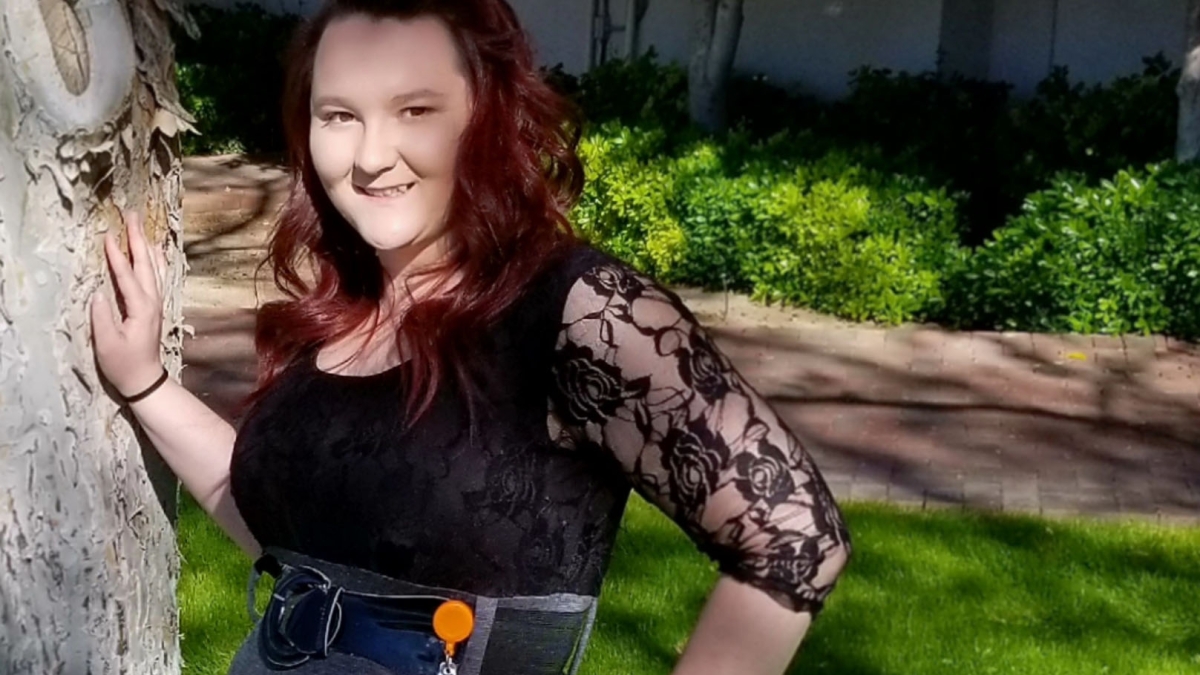ASU interdisciplinary studies grad finds success with 'deeper commitment to grow'

Interdisciplinary studies graduate Tia Anderson.
Editor's note: This is part of a series of profiles for fall 2017 commencement. See more graduates here.
Arizona State University graduating senior Tia Anderson, of Tonopah, Arizona, has been working for Dignity Health while studying full-time to earn her bachelor’s degree in interdisciplinary studies, with concentrations in business, and leadership and ethics.
“Dignity Health is a non-profit that operates hospitals and clinics providing health, social, and support services,” Anderson said. “I started as a temporary worker and then moved to full-time employment while maintaining my full-time student status. By applying what I’ve learned through ASU, I was promoted twice within the organization and look forward to continual growth.”
One of the cornerstones of the interdisciplinary studies major is the required course BIS 401, for which students choose to complete either a semester-long applied internship or a directed study, working with faculty members on research.
Anderson was part of a team of four students in spring 2017 who worked with assistant professors Mai Trinh and Elizabeth Castillo, members of the Faculty of Leadership and Interdisciplinary Studies in the College of Integrative Sciences and Arts, reviewing and coding the literature for the content analysis of prior research studies on leadership.
The team just learned that the resulting paper, “In Search of Missing Time: A Review of the Study of Time in Leadership Research,” has been accepted for publication in the 2018 issue of The Leadership Quarterly Yearly Review.
“Tia impressed me with her dedication to the project, strong work ethic, and thorough analysis of the literature assigned to her,” Trinh said. “She asked good questions and was able to connect the leadership literature with her own lived- and work-experience to provide keen insights to our class discussion. We are grateful for the assistance that our students provided and acknowledge their help on the article.”
“When I first heard about this directed study opportunity, I was immediately excited,” said Anderson, who noted that the experience of doing the directed study did not disappoint: “There’s a great sense of accomplishment when you can use all of the skills you've acquired in your classes and be more involved with faculty and in producing new scholarship.”
Question: Why did you choose to attend ASU?
Answer: I was born and raised in Arizona, so it has always been a dream of mine to graduate from such a prestigious school in my own state.
Q: What’s something you learned while at ASU — in the classroom or otherwise — that surprised you, that changed your perspective?
A: I learned that I am a leader and that I inspire people every day. In grade school, I was a shy girl who found it difficult to make friends. When I first started at ASU I had a mandatory communications class, public speaking. I was terrified, but I conquered my fear and I learned that I am a good speaker and can connect easily with people if I allow myself to. With each class, I learned more and more about myself. Because I am introspective, I was able to become a better leader for myself and my peers.
Q: Looking back on your ASU career, do you see an interesting or defining moment or accomplishment that stands out for you?
A: I withdrew from the university in fall 2008. Most of the time, students who withdraw do not return. I beat this statistic by re-enrolling five years later in fall 2013. I feel like I have beat the odds and it shows me how much determination that I have. I try to live by this quote from novelist Ralph Ellison, "It takes a deep commitment to change, and an even deeper commitment to grow."
Q: What are your plans after graduation?
A: For now, I am going to enjoy some time off and hopefully travel with my family and continue my work with Dignity Health. I am considering going to graduate school and hope to complete a master’s degree related to interdisciplinary studies and leadership. I would also like to start my own non-profit, focused on providing housing for homeless families and veterans and connecting them to other services that they need, like healthcare.
Q: If someone gave you $40 million to solve one problem on our planet, what would you tackle?
A: I would try and tackle homelessness, especially among young adults and veterans. In my ASU course PAF 494: Ending Homelessness through Public Policy, I learned a lot of valuable information about the causes of homelessness, and I hope that even without $40 million I can make a difference by running a non-profit of my own one day.
Q: What was your favorite spot on campus, whether for studying, meeting friends or just thinking about life?
A: I was mostly an online student, but the few times that I met with student work groups for classes, I loved going to Hayden Library at the Tempe campus. I also enjoyed the library at West campus. I remember one night I was leaving Hayden Library and there was a student event going on and there were some break dancers outside the library. What an experience to be working hard, walking out exhausted, and stepping out into such a lively and joyous event! It was instantly refreshing.
More Health and medicine

Reducing waste in medical settings
Health care saves lives, but at what cost? Current health care practices might be creating a large carbon footprint,…

ASU offers bilingual counseling to Spanish speakers
Arizona is one of the five states in the nation with the highest percentage of Hispanic residents, according to the U.S.…

College of Health Solutions launches first-of-its-kind diagnostics industry partnership to train the workforce of tomorrow
From 2007 to 2022, cytotechnology certification examinees diminished from 246 to 109 per year. With only 19 programs in the…

